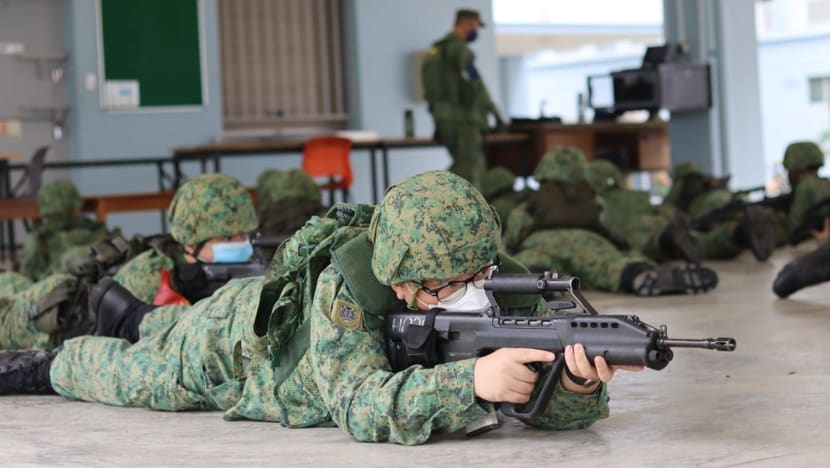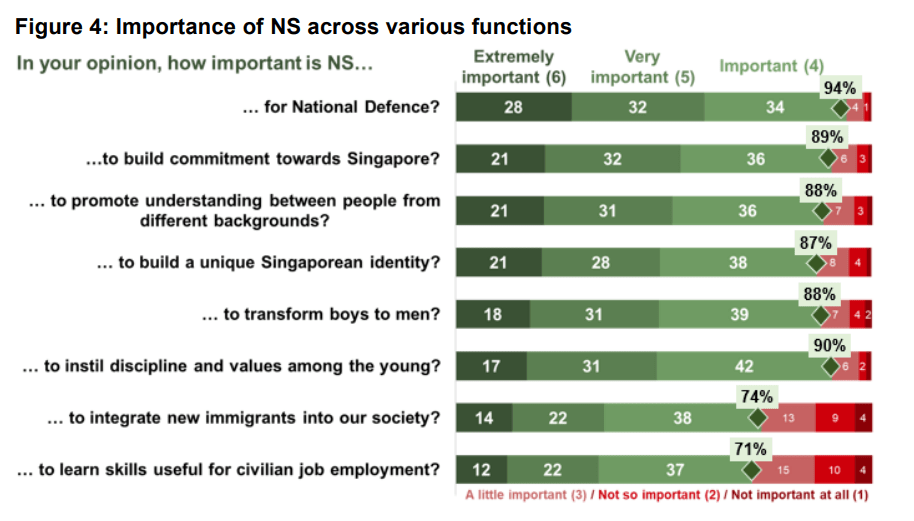Most people in Singapore still support National Service, but fewer view it as important for job skills: Study
Parents surveyed felt that more non-military training could be included to broaden the skillsets of national servicemen.

Operationally ready national servicemen refreshing their SAR21 drills during in-camp training. (Photo: Facebook/The Singapore Army)
SINGAPORE: While most Singaporeans and permanent residents support compulsory National Service (NS), fewer see it as important for learning skills useful for civilian jobs, according to a study by the Institute of Policy Studies (IPS) released on Wednesday (Jul 5).
Findings revealed that most people are supportive of compulsory NS (93 per cent) even if there were no immediate threats to Singapore.
Close to nine in 10 (88 per cent) also said they would encourage their friends and loved ones to serve NS if it was optional.
Despite this, fewer respondents found NS important for learning skills that are useful for employment, with importance declining to 71 per cent in 2022 from 82 per cent in 2013 during the previous study.
Conducted last year, the study looks at public attitudes towards NS and is funded by the Ministry of Defence (MINDEF). It collected results from a survey on 1,002 Singapore citizens and permanent residents aged 17 and above, as well as through focus group discussions and personal interviews.

"DISRUPTOR OF WORK"
Participants at focus group discussions, especially parents, felt that more non-military training could be included to broaden the skillsets of national servicemen - both full-time national servicemen as well as operationally ready NSmen.
“This could be a result of the growing pressures for all to upskill and commit to lifelong learning, coupled with perceptions that NS involved some trade-offs to national servicemen’s education and career trajectories,” said IPS.
NS may increasingly be seen as a “disruptor of work” given the pace of change in the labour market, it added.
"MINDEF should think about how to help servicemen, especially those in their final months of service, transit to their new phase in life whether as a student or worker,” said Dr Chew Han Ei, IPS senior research fellow and principal investigator.
This includes creating opportunities for them to learn skills such as writing a CV, financial management or picking up short courses to prepare them for the next step, Dr Chew added.
MINDEF said in response to media queries that it recognises the importance of supporting national servicemen in their transition to employment or higher education
Last September, MINDEF and the Ministry of Home Affairs partnered with NTUC LearningHub and Employment and Employability Institute to enhance SkillsFuture initiatives for NSFs.
Through this, they have access to a learning platform that gives them unlimited access to online courses, resources, a job and course portal, as well as opportunities to participate in career and education fairs during their full-time NS.
Since 2018, MINDEF and SAF have also progressively introduced work-learn schemes for several vocations in roles critical for Singapore’s defence, such as in the areas of artificial intelligence and engineering.
Under these schemes, NSFs can get a diploma or partial university credits from institutes of higher learning while serving NS full-time and an additional period of regular service, said MINDEF.

While most Singaporeans and permanent residents support compulsory National Service (NS), fewer see it as important for learning skills useful for civilian jobs, according to a study by the Institute of Policy Studies (IPS) released on Wednesday (Jul 5). Ernest Loy reports.
The study also showed that NS was still viewed as “highly important” for other areas such as national defence, building commitment towards Singapore and promoting understanding between people from different backgrounds.
It is also seen as significant for personal character development, including instilling discipline and values.
NECESSARY FOR DEFENCE
Almost all respondents (98 per cent) agree that NS is necessary for Singapore’s defence, with the proportion of those who strongly agree to this increasing to 57 per cent last year from 42 per cent in 2013.
“An agreement of 98 per cent … is very rare and speaks to the belief and support for the institution of NS,” said Dr Chew during a media briefing on Wednesday.
Nearly all respondents (97 per cent) agreed that NS will continue to be important for Singapore in the future. The proportion of those who strongly agreed about NS’ importance to Singapore increased to 57 per cent from 33 per cent decade ago.
Recent heightened geopolitical tensions such as the Russia-Ukraine war might have led to perceptions that NS will continue to be important for Singapore, the study found.
“Several focus group participants also shared that these tensions and certainty serve as a reminder that the ability to defend ourselves is very important and we need NS as a deterrent against external threats,” Dr Chew added.
Strong support from family and employers for national servicemen’s NS commitments was also observed.
More than nine in 10 (96 per cent) national servicemen felt that their families were supportive, while 95 per cent of employed national servicemen also felt the same of their employers.
However, during focus groups, national servicemen also reasoned that employers will have to show support due to the mandatory nature of their reservist commitments.
Close to nine in 10 (89 per cent) respondents said that they felt proud that their family members are serving or have served NS. The study also found that respondents felt that NS helped to enhance national servicemen’s maturity and confidence.
On training safety, 94 per cent of national servicemen were confident that NS training is conducted safely.
The proportion of respondents that strongly agreed training is conducted safely rose from 15 per cent in the previous study to 23 per cent.
Focus groups also highlighted that the positive NS experiences are a result of increased focus on safety and health.
MORE MONETARY BENEFITS APPRECIATED
More than 80 per cent of respondents felt that the government and public adequately recognised the contributions of national servicemen.
About four in five national servicemen felt that their needs during NS were considered (84 per cent) and that their contributions were valued (80 per cent), at least to some extent.
Most national servicemen agreed that they would be motivated by more employer support and good unit leadership.
Additional recognition in the form of monetary benefits to support needs such as childcare and housing would also be appreciated, the study found.
However, more attention could be paid to those in lower-income households as well as national servicemen who may not be able to contribute to their household income when fulfilling their NS obligations.
In response to media queries, MINDEF said NSmen who are students, unemployed or working informal jobs receive a base pay of S$1,600 per month. The amount is prorated based on the duration of the NS activities.
The NS allowance, which supports NSFs in their basic personal upkeep, was also increased this month by S$125 to S$200, depending on rank and vocation.
In addition, the NS Housing, Medical and Education (HOME) awards were enhanced in April last year, to give all national servicemen an additional S$2,000 for completing different milestones in their NS cycle.
For NSFs whose families face financial hardship, they may approach their unit commanders to apply for financial help, said MINDEF.


















